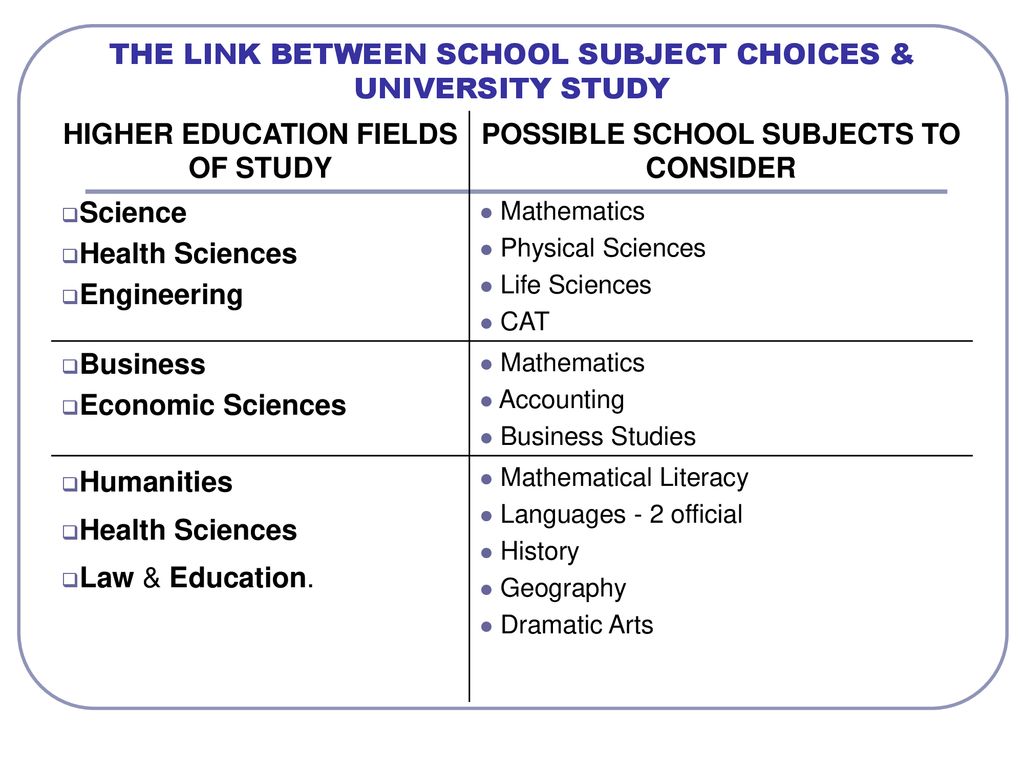Subject Choices in Grade 9 – which subjects should you choose
To decide what you want to do with life in Grade 9 may seem like a big ask, but the subjects you choose for your senior phase in high-school will impact your future. At the end of Grade 9, you will get the opportunity to choose your subjects for Grades 10 to Matric. Your choice of subjects will open up many study opportunities for you and will close others.
It is therefore important that when you are in Grade 9, you ensure that your chosen subjects are aligned with your potential future studies. Your subject choices will also be impacted by the various subjects your school offers.
To ensure you are making the right choice, look at what you would potentially want to study and what subjects you would need to get there. In this article we will dive more into this topic and ultimately help you decide what subjects would be best for you.
How many subjects will you select in Grade 9?
In order to receive your National Senior Certificate (NSC), you will need to complete 7 subjects (and a maximum of 12 subjects). 4 of these subjects are compulsory, with the other 3 chosen by you.
The 4 compulsory subjects are:
- 1 Home Language
- 1 First Additional Language
- Mathematics or Mathematics Literacy
- Life Orientation
Your choice will be from a list of 25 approved subjects, with the option of a maximum of 2 additional languages.
- Languages (Afrikaans, English, isiNdebele, isiXhosa, isiZulu, Sepedi, Sesotho, Setswana, Siswati, Tshivenda, Xitsonga)
- Accounting
- Agricultural Science
- Agricultural Management Practice
- Agricultural Technology
- Business Studies
- Civil Technology
- Computer Applications Technology
- Consumer Studies
- Dance Studies
- Design Studies
- Dramatic Arts
- Economics
- Electrical Technology
- Engineering Graphics and Design
- Geography
- History
- Hospitality Studies
- Information Technology
- Life Sciences
- Mechanical Technology
- Music
- Physical Science
- Religion Studies
- Tourism
- Visual Arts
Can I change my subjects I selected in Grade 9?
Yes – in Grade 10 and Grade 11 you will be allowed to change up to 2 subjects for other subjects. In Matric, you will be able to change 1 subject for another subject.
Find our high school bursaries here
Why is it vital that you make an informed decision?
The subjects you choose in Grade 9 will determine what field of study you will enter post-high school. Therefore, you are strongly encouraged to consider your future study options so that you can make an informed decision. Should you not research your study options before selecting your subjects, you could unfortunately find yourself unable to enter various further education programmes.
Certain career paths may require that you complete a degree at a higher education institution or another qualification (certificate or diploma) through SETA or a FET. In order to qualify for this, you need to choose the correct subjects. This will allow you to meet the necessary minimum requirements for further studies.
With regards to Degree or Diploma studies, it’s important that you choose subjects that connect with your chosen career and that you keep your options open. This is in their event that your plans change as you progress through the years.
Studies after Matric
Once you have chosen the subjects that will gain you admission into university, you will then need to ensure that your performance in each subject is exemplary. You will need to obtain a certain level of achievement to qualify for entry into a tertiary institution, with universities measuring your potential with a point rating system. Therefore, it is vital that you perform well in all your subjects, as it will open more doors in your future.
When applying for tertiary studies, institutions will consider your Grade 11 results before you have written your National Senior Certificate. Therefore, each subject you choose at the end of Grade 9 will have its own entry criteria that you will need to obtain at a certain level.
University and University of Technology studies
Should you choose to study at a university after school, you are required to obtain at least an NSC with a minimum achievement rating of 4 in at least four of the following 20-credit NSC subjects:
- Accounting
- Agricultural Sciences
- Business Studies
- Dramatic Arts
- Economics
- Engineering Graphics and Design
- Geography
- History
- Consumer Studies
- Information Technology
- Languages (be sure to view various institution websites for language entry requirements)
- Life Sciences
- Mathematics
- Mathematical Literacy
- Music
- Physical Sciences
- Religion studies
- Visual Arts
Should you choose to study at a University of Technology after school, you are required to obtain at least a NSC with a minimum achievement rating of 3 in at least four of the following 20-credit NSC subjects:
- Accounting
- Agricultural Management Practices
- Agricultural Sciences
- Agricultural technology
- Business Studies
- Civil Technology
- Computer Applications Technology
- Consumer Studies
- Dance Studies
- Dramatic Arts
- Economics
- Electrical Technology
- Engineering Graphics and Design
- Geography
- History
- Hospitality Studies
- Information Technology
- Languages (be sure to view various institution websites for language entry requirements)
- Life Sciences
- Mechanical Technology
- Mathematics
- Mathematical Literacy
- Music
- Physical Sciences
- Religion studies
- Tourism
- Visual Arts
Read about: APS score for university entrance
Subject choice tool
If you are still unsure of which subjects you should choose (it is a big decision), then this subject selector tool by the Department of Higher Education and Training, may help you with:
- Determining what you can do with different subjects
- Checking which subjects are compulsory for your chosen career field
- Choosing the correct subjects
Subject choices for certain career fields
If you have an idea of what you would like to study after completing high school, you will need to have completed the following subjects (these many differ by university):

Agrisciences
- The following subjects are recommended: Agricultural Management Practices, Agricultural
Sciences, Agricultural Technology, Life Sciences. - Mathematics and Physical Science is compulsory.
Arts and Culture
- The following subjects are recommended: Visual Art, Design, Dramatic Arts, Dance
Studies, Music (depending on your field of interest). - Students who select Mathematical Literacy may have access to all fields of study, however, Mathematics is required for those who would like to complete take Mathematics as a subject at university (Mathematics is possible in the music field of study).
Economics and Business Management
- The following subjects are recommended: Business Studies, Accounting, Economics, Information Technology (depending on your field of interest).
- Mathematics is compulsory.
Education
- The following subjects are recommended for teaching modules (intermediary phase education): Natural Sciences (Ed), Life Sciences or Physical Sciences, Social Sciences (Ed), History or Geography.
- Students who select Mathematical Literacy may have access to all fields of study, however, certain teaching modules may require certain subjects.
Engineering and Technology
- The following subjects are recommended: Civil Technology, Electrical Technology, Mechanical Technology, Engineering Graphics and Design, Information Technology, Computer Application Technology (depending on your field of interest).
- Mathematics and Physical Science is compulsory.
See which bursaries are OPEN for application here
Humanities and Social Sciences
- The following subjects are recommended: History, Geography, Religion Studies, Additional Languages (depending on your field of interest).
- Students who select Mathematical Literacy may have access to all fields of study, however, Mathematics is required for those who would like to complete take Mathematics, Statistics or Economics as a subject at university.
Law
- There are no compulsory or recommended subjects, however, Mathematics is required for those who would like to complete take Statistics as a subject at university.
- Mathematics is compulsory if you want to pursue BCom (Law) or BAccLLB studies.
Medicine and Health Sciences
- Mathematics, Physical Sciences and/or Life Sciences (depending on the requirements of the programme that you choose) is compulsory.
Science and Technology
- The following subjects are recommended: Life Sciences, Information Technology, Computer
Application Technology (depending on your field of interest). - Mathematics and Physical Science is compulsory.
Read our other tips and articles here:
Read our top tips on submitting your bursary application for the best chance of success.
Read our tips on how to write a bursary motivational letter here.
Read about how to prepare for a bursary interview here here.
Read about the various ways to get free education in South Africa.
Read about the National Benchmark Test (NBT) for University Entrance.
Are you following us on social media? We post our latest bursary opportunities and reminders of bursaries closing soon on Facebook, Twitter and Instagram.



This post was last updated in June 2023.
SA Bursaries wishes you the best of luck with your application! Please remember to SHARE this page with anyone you know who may be in need of bursary funding.

